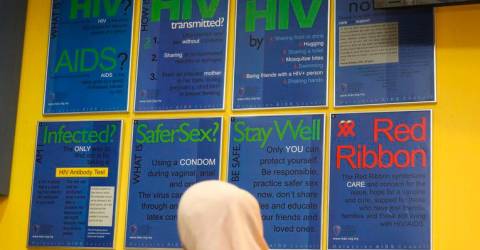Fitness
Call to lower minimum age for HIV testing from 18 to 16

PETALING JAYA: Malaysian AIDS Council vice-president Dr Dinesh Mahalingam said authorities should lower the minimum age of consent for HIV testing from 18 to 16 without parental approval to address the increasing number of AIDS cases.
He said the measure would enable early detection and treatment, improve health outcomes and address the reality of younger adolescents and university students who are at risk of contracting the disease.
“Reducing the minimum age of consent would allow medical and health professionals to educate young people on safe sex and align with global trends advocating lower testing ages.”
Last week, Higher Education Minister Datuk Seri Dr Zambry Abdul Kadir said based on notifications of cases reported to the Health Ministry, HIV infections among university students aged 18 to 25 increased by 24% in 2023.
“A total of 214 students in public or private higher education institutions were infected with HIV in 2020. Cases decreased to 186 in 2021 but increased to 221 in 2022 and 224 in 2023.”
Dinesh said approximately 32% of the 70,000 Malaysians living with HIV were not seeking treatment and this remains an issue in Malaysia’s approach to HIV treatment.
He said despite significant scientific advancements, such as taking Pre-Exposure Prophylaxis (PrEP) in pill or injection form to reduce sexual transmission of HIV by 99%, social stigma remains a formidable barrier.
“This is especially true for young people and university students who may hesitate to seek services or support, which underscores the importance of addressing barriers to treatment and the need for targeted interventions to ensure those with HIV can access and adhere to treatment regimens.”
Universiti Kebangsaan Malaysia public health medicine specialist Prof Dr Sharifa Ezat Wan Puteh said identifying high-risk students is challenging since many may not consent to being tested due to the stigma surrounding HIV.
She said many who are living with HIV remain asymptomatic and this points to how crucial it is to implement strategies that protect student privacy, encourage voluntary testing and provide support.
“The efforts should involve coordination among multiple ministries to ensure they work seamlessly. High-risk students must have their privacy and future uncompromised, regardless of their HIV screening results.”
Sharifa Ezat said growing curiosity about sex among students and their engagement in high-risk sexual behaviour are the main factors contributing to the increase in HIV infections among university students.
She said the trend is reflected in the Global AIDS Monitoring 2023 report for Malaysia, which stated HIV infections are increasingly prevalent among key populations, and Asian Epidemic Modelling projections suggested that men having sex with men would become the dominant mode of HIV transmission in Malaysia by 2030.
“The report highlighted that over three-quarters of new HIV infections in 2022 were among those aged between 20 and 39, with 42% of cases in the 20 to 29 age group and 32% in the 30 to 39 age group.
“From the Malaysian AIDS Foundation 2022 snapshot of HIV and AIDS, as many as 3,177 new HIV infections were detected in 2022, of which 336 were women or girls,” she said as she stressed the need for targeted interventions and awareness campaigns for young people and those at high risk.
She said it is important that those at high risk understand how their behaviour could affect their future, well-being and potential of contracting HIV and AIDS.
“It is essential to educate them early and provide PrEP to students or individuals deemed high risk.”


)






